Part three: the General Election of 1970 and temporary return of Radio Caroline
In May 1970 Radio Northsea International had started broadcasting on a new wavelength, 244 metres, 1230 kHz. The British Post Office resumed its jamming, making listening to RNI on medium wave
difficult over much of England (see cuttings). Public reaction to this first ever peace-time jamming was not as great as might have been expected but about three hundred people turned up
outside the naval base in Kent where the jamming transmitter was based to demonstrate their support for RNI.
 Andy Archer on RNI, reading a prepared statement about the jamming and appealing for the listeners to help campaign against it. The jamming tone can be heard in the background.
Recording kindly provided by Svenn Martinsen (duration 1 minute 35 seconds)
Andy Archer on RNI, reading a prepared statement about the jamming and appealing for the listeners to help campaign against it. The jamming tone can be heard in the background.
Recording kindly provided by Svenn Martinsen (duration 1 minute 35 seconds)
|
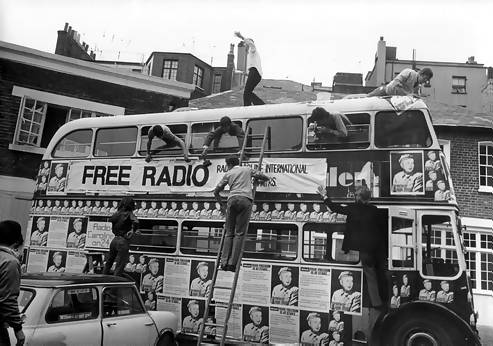
|
|
Preparing a double-decker bus for the station's General Election campaign. Photo courtesy of Hans Knot.
|
When the Government announced that a General Election would take place on 18th June, the free radio organisations swung into action (see leaflet). A second, much larger,
demonstration took place in London as three and a half thousand people rallied at Speakers Corner, Hyde Park, then marched to Downing Street in support of the station (see photos). Former
Caroline DJ Simon Dee and his old boss, Ronan O'Rahilly, acting as campaign advisor, toured Home Counties marginal constituencies in a double-decker bus. They appealed
for Conservative votes because, although the Tories had never actually supported the pirates, it was generally assumed that they were more sympathetic to the cause of free radio than Harold Wilson's Labour Government. RNI
even announced that it would close down altogether if the Labour Party won the election (see cutting).
During the period building up to the election the disc-jockeys broadcast continuous appeals for listeners to help the station as well as playing the campaign song Who Do You Think You Are Kidding, Mr. Wilson?
RNI even changed its name to “Radio Caroline International” during the week of the election in an effort to win extra support.
| RNI PROGRAMME SCHEDULE JUNE 1970 |
| as “Radio Caroline International”
|
5.30am Roger Day
9.00 Andy Archer
12.00pm The Geator With The Heater
3.00 Mark Wesley
6.00 Alan West
8.00 Bob Mackie
11.00 Carl Mitchell
2.00am closedown
|
|
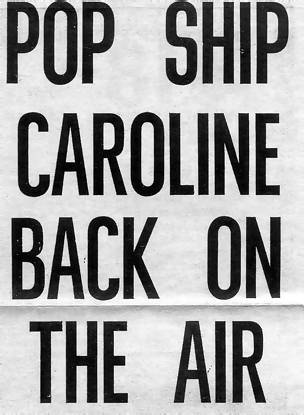
|
|
Click on the headline above to see how The Sunday Mirror reported the return of Radio Caroline. Cutting courtesy of George Morris.
|
 Carl Mitchell and Andy Archer announce the change of station name. Audio from two sources: the CD “Offshore Radio In Europe” and a recording posted on-line by Dave Barnard.
Our thanks to both (duration 2 minutes 12 seconds)
Carl Mitchell and Andy Archer announce the change of station name. Audio from two sources: the CD “Offshore Radio In Europe” and a recording posted on-line by Dave Barnard.
Our thanks to both (duration 2 minutes 12 seconds)
 Roger Day on 13th June. It is the first day of programmes under the new station name and there is a certain amount of confusion. This is an edited version of a recording available from
www.azanorak.com (duration 2 minutes 42 seconds)
Roger Day on 13th June. It is the first day of programmes under the new station name and there is a certain amount of confusion. This is an edited version of a recording available from
www.azanorak.com (duration 2 minutes 42 seconds)
 The Geator With The Heater on 13th June, plugging the Hyde Park rally. This is an edited version of a recording available from www.azanorak.com
(duration 1 minute 16 seconds)
The Geator With The Heater on 13th June, plugging the Hyde Park rally. This is an edited version of a recording available from www.azanorak.com
(duration 1 minute 16 seconds)
 Mark Wesley on the day of the rally, playing Who Do You Think You Are Kidding, Mr. Wilson? and joined in the studio by his colleagues. This is an edited version of a recording
available from www.azanorak.com. Our thanks for this and the clips above to Jim Nantz and Ray Robinson (duration 3 minutes 26 seconds)
Mark Wesley on the day of the rally, playing Who Do You Think You Are Kidding, Mr. Wilson? and joined in the studio by his colleagues. This is an edited version of a recording
available from www.azanorak.com. Our thanks for this and the clips above to Jim Nantz and Ray Robinson (duration 3 minutes 26 seconds)
In 1967, with the Marine Offences Bill looming, the offshore stations of the day had campaigned vociferously against the Government's plans but this was the first time that an offshore station had got
explicitly involved in party politics. British broadcasting organisations operate under strict controls during an election period and are legally bound to provide balanced reporting. No such laws applied to a station
outside the UK territorial limit and by election day “Radio Caroline International” was actively encouraging its listeners to vote Conservative. However by this time not many of them could hear it. On the
night before polling started a second jamming transmitter had come on the air. Based at Canewdon near Southend, this was a much more powerful signal than the previous jammer and it virtually obliterated the station's
AM output. Despite this, RNI broadcast right through the night on election day.
|
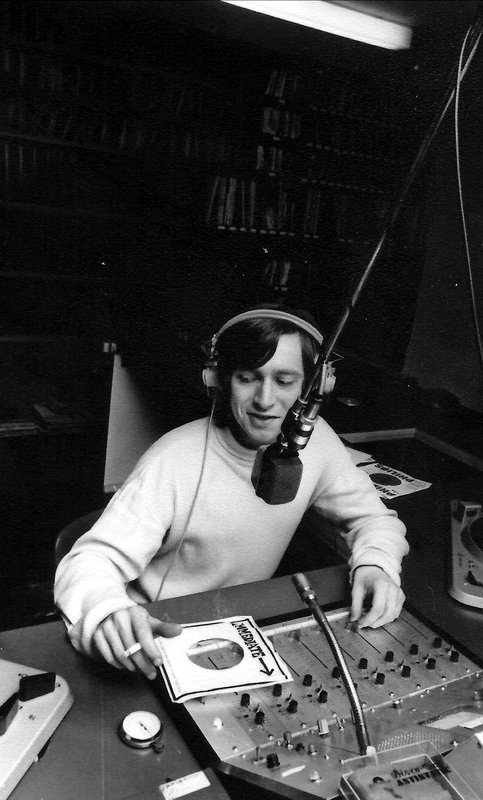
|
|
Alan West in the studio. Photo published by the Free Radio Association from the archive of Rob Olthof, kindly donated by Hans Knot.
|
 Alan West on a station promotion on behalf of the Conservative Party. Recording from The Legend Lives On, a CD issued by Stichting
Media Communicatie (duration 29 seconds)
Alan West on a station promotion on behalf of the Conservative Party. Recording from The Legend Lives On, a CD issued by Stichting
Media Communicatie (duration 29 seconds)
 Alan West reading the 4pm news on the Mark Wesley show on Election Day. Recording kindly provided by Svenn Martinsen (duration 4 minutes 47 seconds)
Alan West reading the 4pm news on the Mark Wesley show on Election Day. Recording kindly provided by Svenn Martinsen (duration 4 minutes 47 seconds)
In the first General Election in which 18 year olds could vote, the opinion polls and the pundits had predicted a close race with, probably, a Labour victory. However, against their expectations, the
Conservatives were returned to power. How much of this victory was down to RNI's campaigning is impossible to measure but it has been suggested that the station just might have changed the course of British political
history.
 Mark Wesley reading the 8pm news on the Alan West show of 19th June 1970, reporting the Conservative victory. This is an edited version of a recording available from www.azanorak.com (duration 2 minute 39 seconds)
Mark Wesley reading the 8pm news on the Alan West show of 19th June 1970, reporting the Conservative victory. This is an edited version of a recording available from www.azanorak.com (duration 2 minute 39 seconds)
 The Geator with the Heater in triumphant mood on 19th June, the day after the election. This is an edited version of a recording available from www.azanorak.com. Our thanks for
this and the clip above to Jim Nantz and Ray Robinson (duration 4 minutes 30 seconds)
The Geator with the Heater in triumphant mood on 19th June, the day after the election. This is an edited version of a recording available from www.azanorak.com. Our thanks for
this and the clip above to Jim Nantz and Ray Robinson (duration 4 minutes 30 seconds)
|
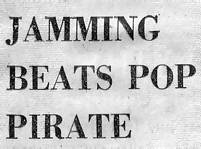
|
|
Click on the headline above to see how The Daily Telegrpah reported the return of the Mebo II to Holland.
|
|
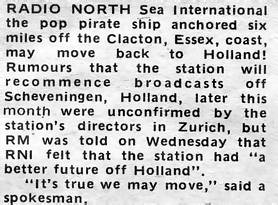
|
|
The Record Mirror reports that the Mebo II may return to Holland, issue dated week ending 25th July 1970.
|
Campaigning for the Tories did not do Meister and Bollier any good. The new administration ordered that the jamming should continue as the station changed its name back to Radio Northsea. In
an effort to beat the jammers, RNI tried moving back to 217 metres but the interfering whistle followed.
During July Britain was not the only country trying to blot out RNI. Norway began to interfere with the 49 metre short wave signal in an effort to persuade the station to move away from the international distress
frequency of 6215.5 kHz. Once it had moved transmissions from 6210 to 6205, this jamming stopped.
RNI continued to fight a losing battle with the jammers until 23rd July when the Ministry of Posts and Telecommunications received a telegram from the station's owners. They had given in. The ship was to sail back to the
Dutch coast. That weekend the Mebo II was anchored back off Scheveningen, Holland, and the jamming was switched off.
|

